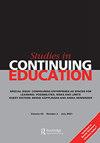经验丰富的护理人员对该领域道德困境的导航和学习
IF 1.9
4区 教育学
Q2 EDUCATION & EDUCATIONAL RESEARCH
引用次数: 0
摘要
本案例研究调查了经验丰富的护理人员如何在现场学习道德决策。这项研究与工作场所体验式学习以及不断发展的关于护理人员角色变化、职业身份以及教育和政策需求的国际讨论保持一致。对25名经验丰富的护理人员进行了访谈,数据分析应用了情景映射以及专题和指导框架编码技术。研究结果表明,在紧急情况下,护理人员并不依赖于正规的教育知识来发展判断,而不是应用和磨练技术技能来应对道德困境。相反,他们依赖于工作经验、包括个人反思在内的自主学习以及他们所处的直接环境背景的结合。与会者表示,在紧急情况下或道德困境发生后不久,主管和可信赖的伙伴在保持协商或汇报的替代方案方面具有重要意义。与会者讨论了移情、慈善和责任的综合原则的使用。那些对压力和创伤保持开放意识,并将反思和有意实践融入工作的参与者,在处理道德困境和对专业成长的承诺方面表现出更细致入微的专业知识。本文章由计算机程序翻译,如有差异,请以英文原文为准。
Experienced paramedics’ navigation of and learning about ethical dilemmas in the field
ABSTRACT This case study investigated how experienced paramedics learn to navigate ethical decision-making in the field. This research is aligned with workplace experiential learning and with evolving international discussions of the changing roles, professional identity, and educational and policy needs of paramedics. Twenty-five experienced paramedics were interviewed, and the data analysis applied situational mapping and thematic and guided framework coding techniques. The findings indicate that during emergent situations, paramedics do not rely on formal educational knowledge to develop judgment in navigating ethical dilemmas beyond applying and honing technical skills. Instead, they rely on a combination of workplace experience, self-directed learning including personal reflection, and their immediate environmental context. Participants conveyed the importance of supervisors and trusted partners in maintaining an alternative to consult or debrief during emergent situations or shortly after ethical dilemmas occur. Participants discussed the use of integrated principles of empathy, beneficence, and accountability. Those participants who maintained an open awareness related to stress and trauma and toward integrating reflection and intentional practice into their work exhibited more nuanced expertise in handling ethical dilemmas and in their commitment to the professional growth.
求助全文
通过发布文献求助,成功后即可免费获取论文全文。
去求助
来源期刊

Studies in Continuing Education
EDUCATION & EDUCATIONAL RESEARCH-
CiteScore
4.70
自引率
6.70%
发文量
22
期刊介绍:
Studies in Continuing Education is a scholarly journal concerned with all aspects of continuing, professional and lifelong learning. It aims to be of special interest to those involved in: •continuing professional education •adults learning •staff development •training and development •human resource development
 求助内容:
求助内容: 应助结果提醒方式:
应助结果提醒方式:


